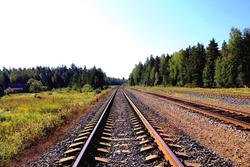 This in one of the findings in a new report where we argue that the rich available data on train performance and railway infrastructure should be used to get precise measurements of economic relationships in railway management.
This in one of the findings in a new report where we argue that the rich available data on train performance and railway infrastructure should be used to get precise measurements of economic relationships in railway management.
Even though each speed reduction only adds about 44-50 seconds to running time, speed reductions still contribute to delay at the destination.
We also show that delays have a negative effect on demand for passenger and freight trains services. The corresponding demand elasticity is lower than the one implied by willingness-to-pay studies, consistent with evidence from Great Britain.
Much of the existing literature on railway punctuality is based on optimization and/or simulation, calling for more empirical studies. In the innovation project PRESIS, funded by the Research Council of Norway and the Norwegian National Rail Administration, we have developed methods to survey reliability in the Norwegian rail sector. The tools consist both of automated descriptive analysis carried out in close to real time, and more detailed analysis of relations which are of particular interest.
For a full English summary of the report: Measuring the inaccurate: Causes and consequences of train delays. TØI Report 1459/2015 Author(s): Askill Harkjerr Halse, Vegard Østli and Marit Killi





